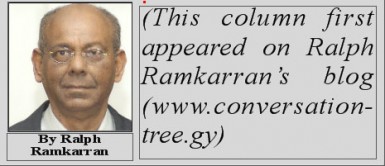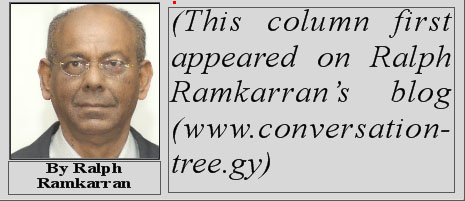Political defections in Guyana have a long and ignoble history. A rare exception was that of Henry Jeffrey towards the PPP, although he never joined that party. Faced with the choice between academic integrity and dishonesty in the mid-1980s when he was writing a book, Guyana, while preparing his doctoral thesis in the UK, he chose the high road. He sat on the executive of the PNC but instead of defending electoral malpractice, he took the position that the PNC had been guilty of electoral fraud. He was dismissed from his job as principal at Kuru Kuru Cooperative College and for several years after his return to Guyana he could not find employment at UG.
Although tied to the PNC during the 1970s and 1980s, he had always exercised an independent political mind. He regularly visited the Michael Forde Bookshop, then something of a mini, pro PPP, intellectual hang-out, now a shadow of its former self, and engaged in polemics while many feared even travelling through that part of Robb Street where Freedom House is located.
He displayed the Mirror at Kuru Kuru Cooperative College. He employed me as a part-time lecturer. During much of this time he was known to some in the PPP leadership and engaged with them from time to time. No PNC activist, sympathizer or state employee dared to do anything similar, but Dr Jeffrey’s actions were never called into question by his political superiors. Upon his return to Guyana after completing his doctoral studies, his engagements with Dr Jagan intensified and there began his journey with the PPP and later the PPP/Civic. He has criticized the PNC but has never joined in its demonization for the purpose of gaining favour in the PPP/Civic.
 Although like all of us he was required to maintain public silence about disagreements while in PPP/Civic governments, his position was always fearlessly independent. He has continued to maintain that tradition in his public comments, so much so that the PPP criticizes him, as when he declared that he would be voting for APNU at the last elections, while also cites him approvingly, which Minister Rohee did in a letter to SN yesterday, for criticizing APNU.
Although like all of us he was required to maintain public silence about disagreements while in PPP/Civic governments, his position was always fearlessly independent. He has continued to maintain that tradition in his public comments, so much so that the PPP criticizes him, as when he declared that he would be voting for APNU at the last elections, while also cites him approvingly, which Minister Rohee did in a letter to SN yesterday, for criticizing APNU.
Guyana has had a long and sordid history of political defections. The PPP has suffered from it more than any other political party to date. After 1964 when the PNC assumed political office, ‘defections’ to the PNC, which had been sporadic, intensified. The motivations were almost exclusively opportunistic, not high minded and principled like those of Dr Jeffrey. For the entire course of the PNC’s term of office, it encouraged defections from the PPP, even of the most junior members, offering jobs and positions. Upon the defection having been consummated there was headline publicity in the state media. The objective was of course to weaken and embarrass the PPP.
The most significant defection from the PPP to the PNC which occurred in the mid-1970s was that of the late Ranji Chandisingh, who was regarded as Cheddi Jagan’s deputy. Problems within the party between Chandisingh and Cheddi Jagan began upon his return from Cuba where he went on a visit with Feroze Mohamed. We now know that it was the Cuban Communist Party, then and still a friend of both the PPP and PNC, which encouraged Chandisingh to defect from the PPP to the PNC because they felt that the PNC had gone sufficiently left and this trend needed to be strengthened by a Marxist-Leninist of high intellect, standing and commitment like Chandisingh.
Instead of Chandisingh simply resigning for ideological reasons, he opportunistically raised a plethora of petty accusations to denigrate the PPP leadership, no doubt as part of the price for being accepted in the PNC. Chandisingh went on to become a Vice President, General Secretary of the PNC and an Ambassador to the USSR. When he died just a few years ago then General Secretary of the PPP, now President Donald Ramotar, spoke at his funeral in glowing terms.
Other high profile defections included Harry Lall, the General Secretary of GAWU, Vincent Teekah, the editor of the Mirror, who was appointed the PNC’s Minister of Education, Halim Majeed, head of New Guyana Co Ltd and others.
The defections from the AFC must have been traumatic for that party. It was for the PPP every time over two or more decades. But the AFC faces greater challenges as a third party. Its principal tasks are to define itself, maintain a multi-ethnic appeal in a situation of rigid ethnic voting patterns and devise a strategy to deal with a situation where it is likely that the PPP will remain the largest political party. For an opposition political party in Guyana, it has to become accustomed to defections, but these will not be its biggest challenges.
For the PPP the defections from the AFC to APNU are ominous signs. They are not shifts towards the PPP but principled departures to APNU which gains from them and is the winner. For this reason the PPP has nothing to shout about but a great deal of work to do so as to be seen as the party of choice for youth and intellectuals, groups which have been inclining towards the AFC.






